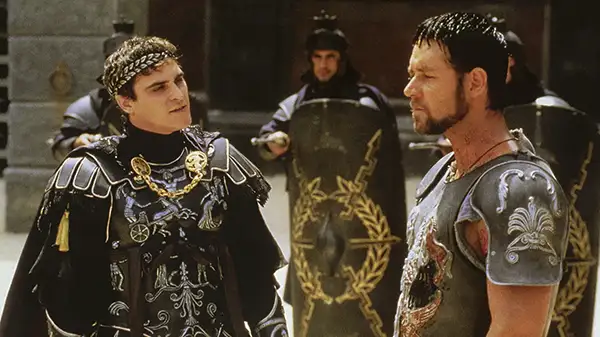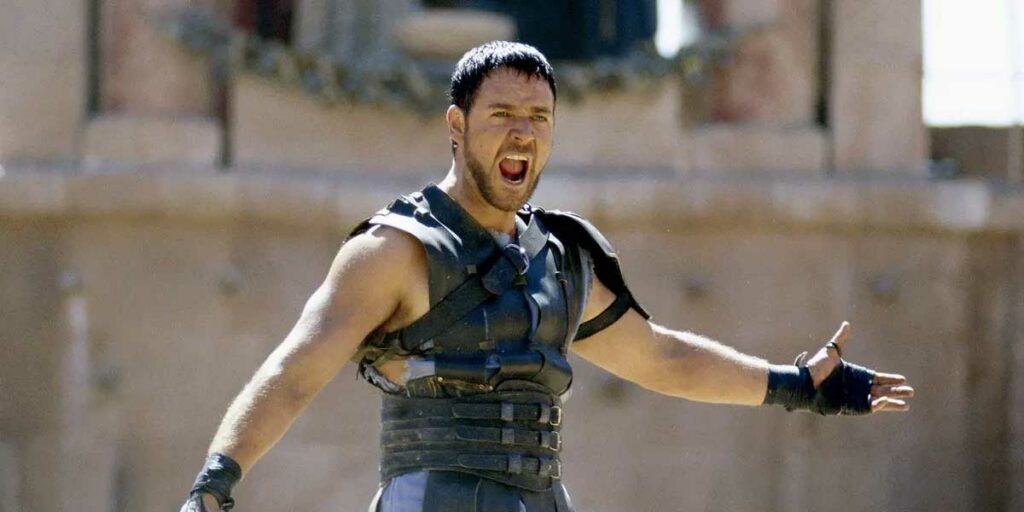A cavalcade of exceptional visuals, great acting and top notch direction makes Gladiator one of Hollywood’s greatest epic films.
The epic is a difficult film to pull off well; it seems for every Lord of the Rings or Seven Samurai, there’s a Pearl Harbor or a Waterworld. Filmmaking is already difficult, but on such a grand scale with so many variables, it’s genuinely impressive that any good epics exist at all. While Ridley Scott has made epics before and after 2000, Gladiator remains his best-known and best-received, earning twelve Oscar nominations and five wins, leaving an exalted legacy. And for good reason: a cavalcade of exceptional visuals, great acting and top notch direction makes Gladiator one of Hollywood’s greatest epic films.
Gladiator follows Maximus (Russell Crowe), a Roman general who falls from grace and is sold into slavery as a gladiator after being betrayed by the new emperor, Commodus (Joaquin Phoenix). With his family gone, all Maximus has left is the arena, and his need for vengeance, determined to get it whether it be in this life or the next.
Immediately, one of Gladiator’s greatest strengths is its visuals: for a film that was released over twenty years ago, it still looks outstanding. In an era when mass-CGI use was in its infancy, resulting in some visuals that look dated by today’s standards, Gladiator’s use of practical effects hold up extremely well! This is especially prevalent in the colosseum and combat scenes. The stunt work and fight choreography are still enthralling enough to leave you on the edge of your seat, and the use of actual chariots, tigers, fire, trebuchets and massive crowds add to the spectacle in a way that looks genuine and holds up to modern visual standards. Not to mention the violence itself strikes a nice balance of brutal without being gratuitous. For example, yes a person gets sliced in half by a runaway chariot, but it’s presented in a way where you get a clear and satisfying idea of what is happening without the need for entrails to go flying.
Gladiator’s visual excellence, however, goes beyond just its action scenes. The set pieces appear a marvel to behold: whether it’s through the art of perspective or through physically built sets, the film effectively creates a sense of immense scale and majesty in the visuals, from the bombastic opening battle in Germania to the opulence of ancient Rome. One place where the visuals falter would be the overreliance on slow motion. Gladiator, by and large, is edited and presented well, offering fast-paced and exciting action, and juxtaposing it with more static and dramatic scenes. But there are slow-motion sections that often feel too melodramatic, but also look like they may have been filmed at a different frame rate than the rest of the movie, so that may be distracting to some viewers.

Of course, no discussion of Gladiator would be complete without mentioning the acting, because it is outstanding across the board. Russell Crowe shines in his Oscar-winning performance as Maximus, perfectly balancing a soldier’s brutality with the sensitivity and vulnerability of a freshly-traumatized family man. Joaquin Phoenix delivers one of the best performances of his career as the young Commodus, the scheming and entitled emperor of Rome. He gives the character depth and nuance beyond being just a spoiled brat, creating a villain with clear and understandable motives and pain while still getting you to utterly hate him. Oliver Reed, Connie Nielson, Djimon Hounsou, Richard Harris, and Derek Jacobi round out the cast, and while their characters are all pretty stock and familiar, they all give spirited portrayals and memorable performances.
If I had to give some negative criticism, it would be directed at the script. While by no means bad, it does feel, for lack of a better word, clichéd. It uses several narrative tropes with which we’re all well familiar by now: the trope of the betrayed man who lost his family and is now seeking vengeance was already pretty tired by the new millennium, and Gladiator doesn’t do anything to subvert or expand upon it. And the dialogue, while certainly doing its job, does sometimes feel plain. All the actors are able to effectively and dramatically deliver their lines so it’s usually not a problem, but outside of maybe two famous exceptions, memorable monologues or bits of dialogue that will stick with you after the credits roll tend to be a rarity.
Despite its predictable script, Gladiator still succeeds due to how exceptional all of its other elements are. I have my gripes with the Hollywood system, but Gladiator is an example of how it is capable of producing something exceptional. It’s usually pretty easy to tell when passion and dedication goes into a project, and Ridley Scott’s passion and dedication are on full display here, despite the well-documented behind-the-scenes drama. When zeal and artistry are given the resources they need, something incredible can come out of it.
Gladiator is now available to watch on digital and on demand. Read our review of Ridley Scott’s Napoleon.

